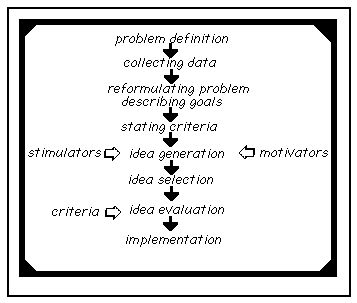
computer (computer-assisted creativity)
For every complete work a complete human being is needed
Brahman saying
The yes/no machine, working on the binary code: 0 - 1. One of the greatest inventions of our time. Till now we had to analyse and compute all our thinking and ideas ourselves. This machine does it for us, this is to say the computing. It is a wonderful copy of the left half of our brain, but it cannot create ideas. It is important to use it as effectively as possible and remember it is a superlogic brain operating to the gigo principle ('garbage in, garbage out and not: garbage in, gospel out!).
Computers may take over the 'processing' part of the thinking so that the 'idea' part will become more and more important. On the whole, computers are so uncreative that in order for them to work at all you have to give them the starting 'ideas' and the instructions for dealing with them. The computer then processes the ideas according to the instructions and gives you the result that arises from the combination of those ideas and those instructions. The computer is instructed to use a mathematical technique to work out the best course of action. However, the outcome is determined by how the situation is looked at in the first place: what factors are taken into consideration; the importance or values that are given to the chosen factors, and so on. It is this initial 'idea' stage ( or perceptual stage) that really determines the answer. The 'processing' stage, however excellent, can do no more than tell you what is implicit in the idea stage. Thus the four stages of thinking are :
1 the idea stage
2 the processing stage
3 the evaluation stage and
4 the implementation stage.
In fact the very excellence of the computer in the processing stages places a growing burden on the human mind, which has to set up the starting ideas. Not only does the human mind have to set up questions for the computer to answer but it also has to make sense of the answers.
We are told we live in a world of exploding information; every day there is more and more to learn. But actually we live in a world of exploding data - not information. Ideas are the spectacles through which we have to look at data in order to see information. We act on information, not on data. And, contrary to what most scientists are taught, data cannot turn into information without ideas. It is as necessary to learn how to generate ideas as it is to learn how to generate and process data.
It is in this first stage of thinking (the pre-logical idea stage) That the creativity of the human mind cannot yet be replaced by computers.
Besides the processing the computer is a useful tool in generating, structuring and evaluating the creative process. There are numerous mindmapping programs: such as Nova Mind, Mindmanager.
It can order and structure our thinking and what is more: it is unemotional. There is already software available to assist in the idea search. The software is meant to structure the creative process of the individual or group from convergence via divergence to convergence. The use of sounds and colours, and even odours will become common. Especially visualization is important, one picture says more than a thousand words. The idea generation is done by means of all kinds of techniques, such metaphors, analogies and double reverse. As the computer stores all data and provides feedback, the number of ideas will increase. Ultimately it is the quality of the idea selected, but in the process stage, quantity is what counts. Generally programs follow a structure for convergence and divergence.

The idea is that the computer does not do the thinking for us, but helps us by feeding back, asking questions and structuring the data. Often the things which pose most difficulties in group sessions. The computer serves as a sounding board and stimulator. Nearly everyone likes it. An interesting first generation program is the Idea Generator®. By means of techniques such as opposite perspective, metaphor, different perspectives it is a useful tool to help in finding new opportunities instead of solving problems according to the same routine.